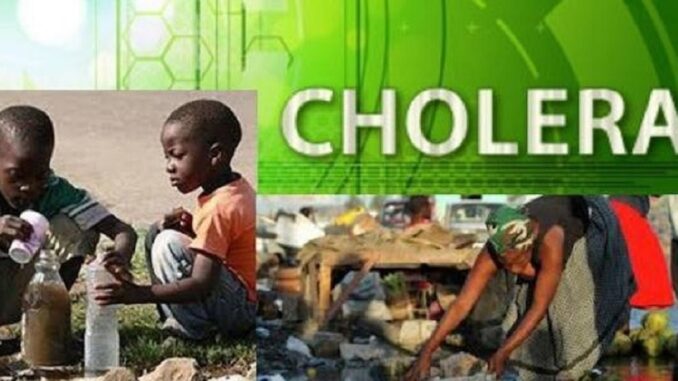
NCDC Set To Declare Emergency On Cholera Outbreak in Nigeria- Newsone …C0NTINUE READING HERE >>>
Newsone Nigeria reports that the Nigeria Centre for Disease Control and Prevention said, on Wednesday, it might declare an emergency on the outbreak of cholera in the country.
This online news platform understands that the NCDC Director General, Dr Jide Idris, who spoke in Lagos, said the centre was monitoring the situation and might declare an emergency if data showed that the outbreak had gone beyond a manageable threshold.
The NCDC Director General spoke at the Adetokunbo Alakija Memorial Travel Medicine Lecture held at Civic Centre, Victoria Island, orgainised by the Nigerian Society of Travel Medicine.
Newsone understands that as Nigeria battles a cholera outbreak in 30 states, the World Health Organisation, the United Nations Children's Fund, and the International Organisation for Migration held an emergency meeting in Lagos on Tuesday.
WHO Country Representative, Dr Walter Mulombo, disclosed this on his X handle.
In its recent report, the NCDC said from January 1 to June 11, 2024, over 1,141 suspected and over 65 confirmed cases of cholera, resulting in over 30 deaths, had been reported from 96 LGAs in 30 states.
Amid this, the Lagos State Ministry of Health said it had recorded 350 suspected cases of cholera in 29 wards across multiple LGAs with 17 confirmed cases and 15 fatalities attributed to severe dehydration caused by delayed presentation.
After delivering his address on the theme: ‘Collaborative Platforms and Networks, Strengthening Travel Medicine in Nigeria,' the NCDC DG, while responding to a question from our correspondent for an update on the Cholera outbreak, said the agency had been conducting a risk assessment.
Olajide said, “We have been tracking cholera cases and we are documenting them. For the last two or three weeks, the incidence shot up, with a rising number of deaths and that is why we started investigating and this is where Lagos State came in.”
He maintained that based on the data that would be obtained from all the partners involved in the assessment, “if they look at the data and they decide that the situation has gone beyond a particular threshold, then we call it an emergency situation.”
He said the agency was still awaiting reports from the team conducting the investigation.
“So when they come, when they bring the data, if it has gone beyond a particular threshold, we declare an emergency,” he added.
Olajide, however, warned that prevention and preparation were key to tackling such a disease outbreak.
“We must prepare; prevention means to create the facilities that you will need, the isolation centres, and look at the human resource you have, etc,” he said.
On her part, Governor Babajide Sanwo-Olu's Special Adviser on Health, Kemi Ogunyemi, said cholera had much to do with the environment and the Ministry of Health had to work with environmental agencies to address the menace.
She said, “It's all about the environment, it's about water, it's about what you eat, it's about people defecating, and all that is flushed into the drainage system. It's not just the Ministry of Health, we cannot work in isolation, and we are trying our best. We have programmes – the Water, Sanitation and Hygiene known as WASH. We are trying to get clean water into all (areas), we are looking at pipes that are broken, and the things that are not working, etc.”
She urged people to also take individual responsibilities by maintaining personal hygiene.
Meanwhile, on Wednesday, the Lagos State Government issued precautionary measures on cholera prevention to schools, parents and guardians.
A statement signed by the Commissioner for Education, Ministry of Basic and Secondary Education, Jamiu Alli-Balogun, explained that the state government had created awareness among vulnerable groups and the school system to contain the outbreak.
In the guidelines or advisories, the state government urged schools to: “Ensure that all school food handlers follow strict hygiene practices to prevent contamination and the spread of diseases.
>

Leave a Reply